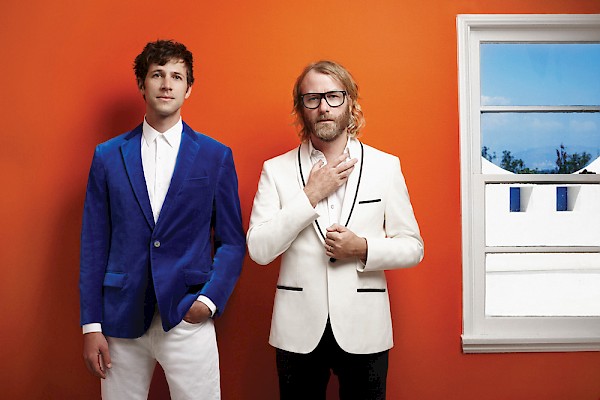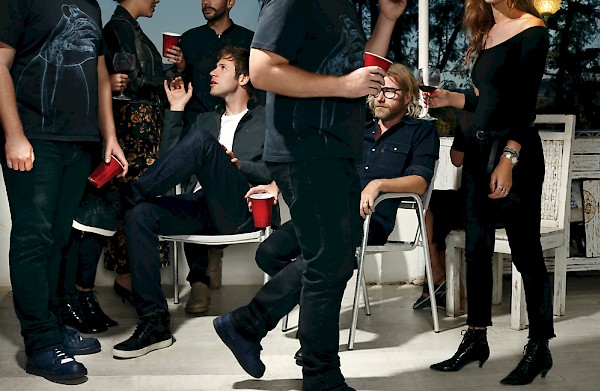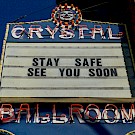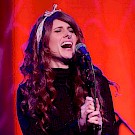 Knopf and Berninger: Photo by Deirdre O’Callaghan“Hey, do have any extra little bits of music that don’t have a home yet?” asked Matt Berninger back in 2009.
Knopf and Berninger: Photo by Deirdre O’Callaghan“Hey, do have any extra little bits of music that don’t have a home yet?” asked Matt Berninger back in 2009.
“How much should I send?” responded Brent Knopf.
“Send it all.”
Berninger may not have expected to find “over 400 tunes, little ideas, snippets, loops and sessions” in his inbox, but that’s what he got. “I think I sent over 11 hours,” Knopf recalls. “And I think he was taken aback by the quantity,” but eventually, “he started pulling out the stuff that he liked, [moving it] into another folder called The Moon, and he started humming over it and adding some melodies and lyrics to it and sending it back—that started the process of us…”
Us being EL VY—pronounced like a plural of Elvis, one that rhymes with hell pie—the new project that brings together the emotion-drenched baritone vocals of The National’s Matt Berninger with the painstakingly piquant production of Portland’s Brent Knopf—best known for his meticulous work with Ramona Falls, Menomena and Lost Lander.
The genesis of their debut record, dubbed Return To The Moon, was somewhat shrouded in secrecy, at least until November of last year, mostly because neither really thought anything would ever come of the artistic exchange that they’d “been nebulously talking about” for years. But then, “all of a sudden it seemed like we had a little window of time to make it go,” Knopf says.
Much like Knopf’s past projects, the pair Ping-Ponged musical ideas back and forth, strengthening the material with each volley.
“It’s like two people solving a Rubik’s Cube by trading moves: You have this puzzle and you’ll twist one side and hand it over to your collaborator and they shuffle it some more and hand it back. All of a sudden you hadn’t expected all of these yellow squares to be on the same side but now they are and that gives you an idea for how to get all of the orange squares on the other side,” Knopf explains.
 All of this created “a wider aesthetic spectrum than most things I’ve done in the past,” Knopf says, from the spacious, haunted doo-wop of “Silent Ivy Hotel,” to the effervescent and wistful closer “Careless,” to the dynamic “Sad Case,” which Knopf describes as sounding “like sharp teeth gnashing.”
All of this created “a wider aesthetic spectrum than most things I’ve done in the past,” Knopf says, from the spacious, haunted doo-wop of “Silent Ivy Hotel,” to the effervescent and wistful closer “Careless,” to the dynamic “Sad Case,” which Knopf describes as sounding “like sharp teeth gnashing.”
Lyrically, Berninger calls Return To The Moon his most “autobiographical” record yet, featuring shards of himself—places from his punk rock youth in Cincinnati (The Jockey Club) as well as his love for his family—but the characters (Didi and Michael) weaved throughout the album’s 11 tracks are make-believe. The names are inspired by Minutemen’s D. Boon and Mike Watt, and the narratives are influenced by the pair’s creative brotherhood as much as Olivia Newton-John and John Travolta’s relationship in Grease—all an imaginative conflation of these stories blended and mashed with his own experiences.
Meanwhile, Knopf handled the musical direction and performance aspects during multitudinous takes of keys, guitars, synths and bass, while inviting Portland friends to supply the drums (Drew Shoals), violin (Lauren Jacobson) and backing vocals (Moorea Masa, Allison Hall, Margaret Wehr)—almost entirely recorded in the basement of the Falcon Art Community. Then there’s the vocal contribution that Knopf’s most ecstatic about: 74-year-old soul singer Ural Thomas.
During the recording, Masa, who sings in Thomas’ backing band The Pain, moved into a Falcon studio and quickly connected Knopf and Thomas. “Boy, that man is a pure delight,” Knopf beams. “It’s hard not to use hyperbole when you describe Ural because he’s just that amazing.”
Providing vocals on a few tracks, Thomas is featured on “Sleepin’ Light,” but the female vox, integral to several songs, were actually a last-minute addition. With Knopf grabbing Masa and her harmonious partners from across the hall, it was “one of those moments where you’re just so grateful to live in Portland,” Knopf says. All of the Portlanders really shine on the record, plus the live band features Lost Lander’s Matt Sheehy on bass and Wye Oak’s Andy Stack behind the kit.
Knopf is known for his scrupulously lavish arrangements, but the pair’s collaborative window was a finite one that contributed to a conscious, deliberate effort to simplify the compositions. Distilling each song to the most important elements, Knopf did not allow himself to belabor over pieces that didn’t readily fit the puzzle.
 Photo by Deirdre O’Callaghan“I was more merciless with how much of myself I pruned away,” Knopf describes. “If there’s any difference between this and previous records, it was that I had bigger and sharper pruning sheers.”
Photo by Deirdre O’Callaghan“I was more merciless with how much of myself I pruned away,” Knopf describes. “If there’s any difference between this and previous records, it was that I had bigger and sharper pruning sheers.”
The result is the most carefree work of their respective careers. “Left to our devices, we might be known more for our shadowy, gloomy songs, but for some reason, you put us together and all of a sudden there’s more of a sense of levity and play,” Knopf says—something that’s immediately heard in the opening two songs (“Return To The Moon” and “I’m The Man To Be”—watch the lyric video below) and seen in accompanying videos and Instagram posts.
EL VY is an escape and “an excuse to collaborate and make a record together,” Knopf explains. It was still hard work, of course, “but the approach wasn’t as much of a pressure cooker.”
Fewer self-imposed expectations led to an album that’s very diverse—sonically and lyrically—and even comical at times. For Knopf, “It was less precious—I had more of a cavalier attitude about approaching the songs. Since I already have that place [Ramona Falls] to be neurotic and self-conscious, EL VY has been more of a place to let our hair down a bit—not that I have long hair, but Matt does—and it’s just a place where we can not stress out.”
“It sounds like two guys who really trust each other to do their thing. And to have fun.”








